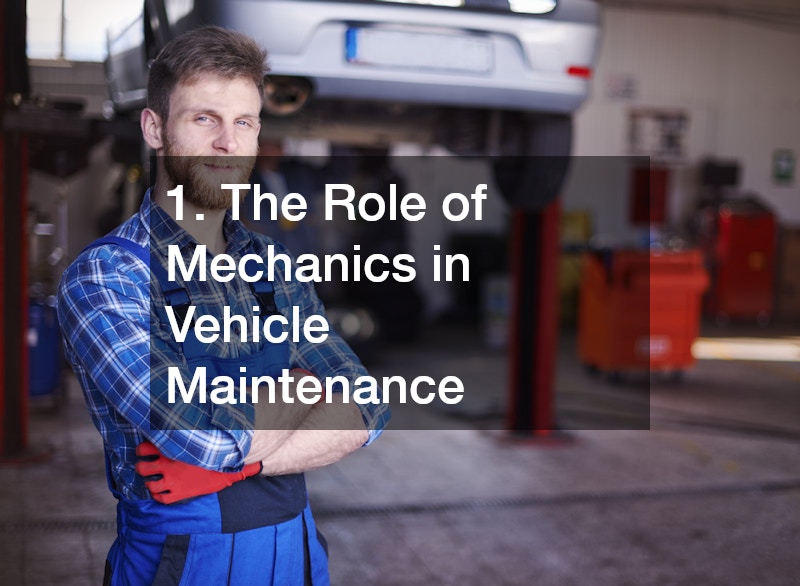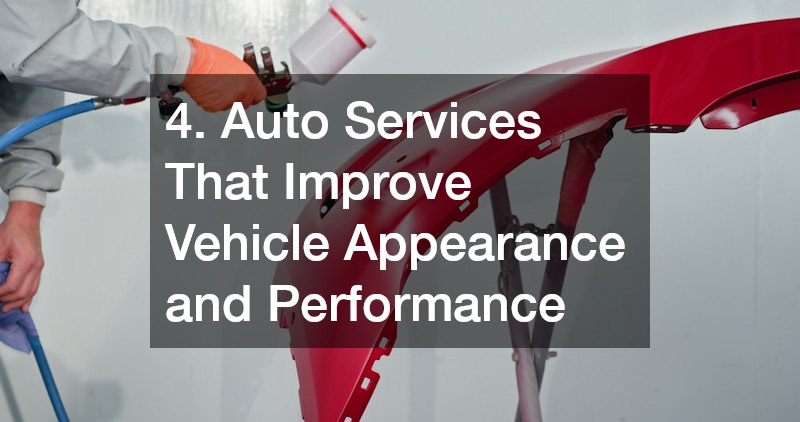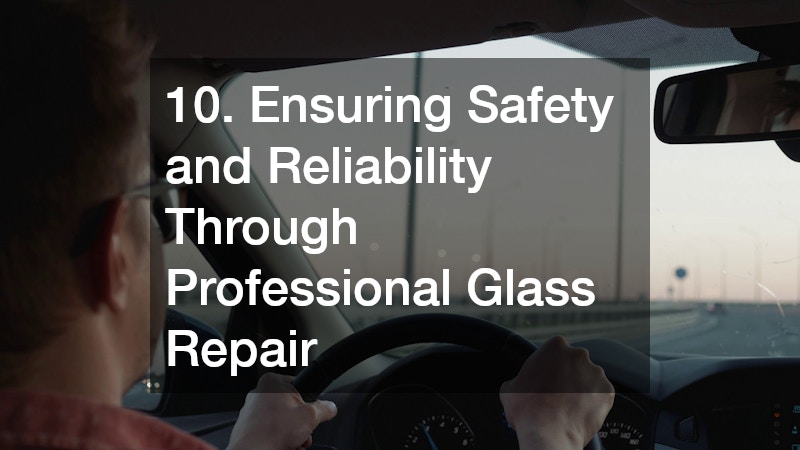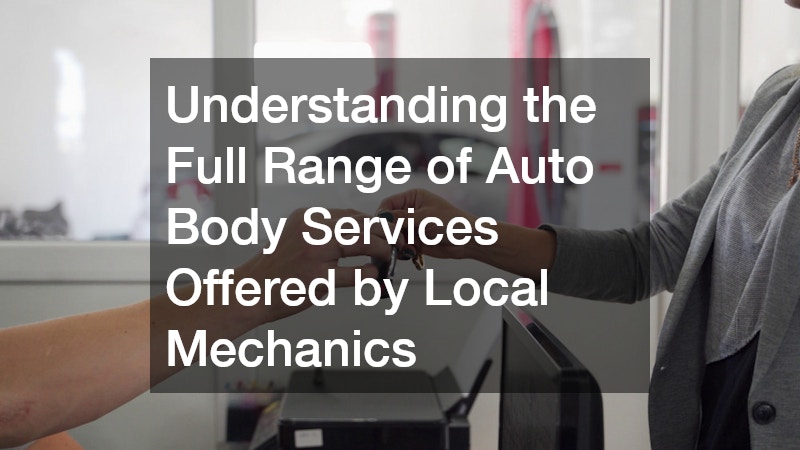Understanding the Full Range of Auto Body Services Offered by Local Mechanics
Modern vehicles are marvels of engineering, designed to provide safety, comfort, and reliability. However, with such advanced systems, maintenance and repair become an essential part of vehicle ownership. Auto body work extends far beyond cosmetic fixes; it’s an integral process that preserves the vehicle’s structure, performance, and resale value. Whether you’ve had a minor dent or a major accident, understanding what auto body services entail helps you make better, more confident decisions about vehicle care.
Today’s repair industry has evolved to include everything from advanced computer diagnostics to precision paint matching and structural realignment. Professional technicians are equipped with cutting-edge tools and training to handle everything from electrical issues to frame damage. Yet, many vehicle owners still don’t fully understand the depth of what these services involve. This guide aims to demystify that, offering a comprehensive look into the range of work performed, how it protects your investment, and what to expect when working with professional auto body experts. By learning what’s available, you can extend the life of your vehicle, maintain its value, and drive with greater confidence every day.
1. The Role of Mechanics in Vehicle Maintenance

Local mechanics play a vital role in the automotive ecosystem. Unlike large dealerships that often come with high costs and rigid service options, independent professionals provide a personal, trustworthy approach to repairs and maintenance. Their reputation depends on the community’s satisfaction, which often translates into higher-quality service and more transparent communication. Many local shops offer flexible scheduling, competitive pricing, and hands-on attention that big chains struggle to match. For car owners, this means having a go-to resource for questions, maintenance needs, and reliable repair recommendations.
Beyond general upkeep, local mechanics often handle both mechanical and aesthetic repairs, using diagnostic tools and quality parts to restore vehicle performance. They typically collaborate with body technicians to address damage resulting from accidents or wear. Whether you’re dealing with alignment issues, framework, or engine repairs, these local experts bring both technical precision and accountability to their work. Their deep community roots mean they value long-term customer relationships over one-time transactions, making them a dependable choice for ongoing vehicle maintenance and complex body repairs.
2. Comprehensive Repair Services Every Owner Should Know
Car repair encompasses far more than fixing what’s broken—it’s about ensuring every component works in harmony to keep you safe and your vehicle efficient. From routine oil changes and fluid checks to advanced diagnostics, these services prevent future breakdowns and extend your car’s life. Skilled technicians address issues before they escalate, reducing the likelihood of unexpected expenses or roadside emergencies. Regular maintenance also helps maintain manufacturer warranties and prevents major performance decline over time.
For more specific work, professional shops handle brake adjustments, suspension tuning, engine troubleshooting, and electrical repairs. Comprehensive car repair also includes preventive inspections that identify potential problems early, such as worn belts, damaged sensors, or leaky gaskets. Establishing a routine maintenance schedule with a trusted repair provider not only improves safety but also minimizes costly downtime. Keeping detailed service records is another smart step—these can improve your resale value and make insurance claims smoother when repairs are needed.
3. Collision Repair: Restoring Safety and Structure After an Accident
After an accident, collision repair restores your vehicle’s structural integrity, safety systems, and appearance. This process goes far beyond surface damage—it involves frame straightening, panel replacement, and component recalibration. Auto body professionals use advanced technology like laser measuring and computerized frame alignment to ensure everything fits exactly as it did before the accident. Because modern vehicles rely on precise structural balance for airbag timing and crash safety, quality collision work is a matter of protection, not just presentation.
When seeking collision repair, it’s important to choose a facility that works with high-quality materials and certified technicians. Professionals evaluate hidden damage beneath the surface, ensuring that the frame, suspension, and safety systems are fully restored. They also match the vehicle’s paint and finish using advanced color-matching software, guaranteeing a seamless result. You’ll also receive detailed documentation to present to insurance providers, which helps ensure that coverage and repair approvals move smoothly. Investing in expert repair protects not only your car’s value but also your peace of mind every time you drive.
4. Auto Services That Improve Vehicle Appearance and Performance

Auto body services encompass a wide array of restoration and cosmetic procedures that keep your vehicle looking and performing its best. These include dent removal, scratch repair, paint restoration, and corrosion treatment. Beyond aesthetics, bodywork also impacts functionality—rusted or misaligned panels can affect aerodynamics and fuel efficiency. Maintaining the outer body isn’t just about pride in appearance; it contributes to the car’s long-term reliability and overall safety by protecting underlying structures from deterioration.
In practice, technicians may perform paintless dent repair to fix small dents without disturbing the factory finish or conduct full repainting for vehicles with widespread damage. They may also replace panels, repair bumpers, and seal rust-prone areas to prevent future corrosion. Every repair is done using manufacturer-approved materials and methods to retain vehicle integrity. When combined with mechanical maintenance, these auto body services help your vehicle maintain a like-new appearance and reliable performance for years to come.
5. Windshield Services and Auto Glass Repair
Auto glass plays a crucial role in maintaining both visibility and vehicle structure, which is why professional windshield installation service is essential. The windshield contributes to roof support and proper airbag deployment during a collision. Technicians use specialized adhesives and precision-fitting tools to install glass that meets or exceeds original equipment standards. They also inspect seals to prevent leaks and reduce wind noise, ensuring both safety and comfort.
When cracks or chips appear, timely auto glass repair can prevent them from spreading. Small damages can often be filled using resin technology that restores clarity and prevents structural weakening. However, once cracks extend beyond a few inches or obstruct the driver’s line of sight, replacement becomes necessary. A certified professional ensures that sensors and cameras associated with modern driver-assist systems are properly recalibrated after installation. Quality glass work doesn’t just improve visibility—it strengthens your vehicle’s frame integrity and overall crash safety.
6. Brake Repair: Protecting Passengers and Property
Brakes are one of the most critical components of any vehicle, and reliable performance depends on consistent maintenance. A professional brake repair service ensures that pads, rotors, and calipers are inspected and replaced before they wear out. When braking systems degrade, stopping distances increase, and driver safety is compromised. Technicians examine fluid levels, check for leaks, and test for proper pressure balance within the system to guarantee smooth, responsive stopping power.
Warning signs like squealing noises, grinding sounds, or a soft pedal should prompt immediate inspection. During a brake service appointment, experts use specialized gauges to measure wear and precision tools to resurface rotors when possible. They also test anti-lock braking systems to confirm accurate sensor performance. Scheduling regular inspections at least twice a year—particularly before long trips—can help detect issues early and prevent accidents. High-quality parts and professional calibration make the difference between safe braking and potential failure on the road.
7. AC Repair: Comfort and Efficiency in Every Season

Your vehicle’s climate control system is vital for comfort and air quality inside the cabin. When temperatures rise or humidity increases, an effective car AC repair becomes indispensable. The air conditioning system involves several components, including a compressor, condenser, evaporator, and refrigerant lines. Any one of these can malfunction, leading to poor airflow, foul odors, or inconsistent cooling. Professional inspection ensures that leaks are sealed, refrigerant is recharged, and pressure levels are properly balanced.
Experienced technicians use advanced diagnostic equipment to locate leaks or compressor issues quickly. They may flush and replace refrigerant, clean the evaporator coils, and test cabin temperature sensors. In addition to comfort, a well-functioning air conditioning system also aids in defogging windows and maintaining visibility. Regular AC maintenance improves efficiency, prolongs component life, and keeps fuel consumption stable. Having your system checked annually—especially before peak summer months—ensures dependable performance when you need it most.
8. Choosing the Right Repair Shop for Your Needs
Selecting the right auto repair shop is an important decision for maintaining your vehicle’s performance and reliability. Start by researching facilities with certified technicians and positive customer reviews. Check for affiliations with professional organizations like ASE or I-CAR, which indicate up-to-date training. Transparency is key—trustworthy shops provide detailed estimates, explain recommended services, and guarantee their work. An experienced repair facility will also maintain proper licensing and insurance coverage, which protects both the customer and their vehicle.
When comparing service centers, consider turnaround time, equipment quality, and warranty terms. Some car repair shops offer digital inspections that allow you to view photos or videos of the issues before approving work. Others specialize in particular services, such as advanced diagnostics or electric vehicle maintenance. Keep a consistent relationship with your chosen provider; having a single trusted source for regular maintenance and major repairs ensures a detailed service history that supports both vehicle safety and resale value over time.
9. How Preventive Maintenance Reduces Long-Term Auto Body Costs
Preventive maintenance is one of the most effective ways to reduce long-term vehicle expenses. Routine inspections and timely interventions help you catch problems before they cause extensive damage. For example, replacing a small part today can prevent costly bodywork or engine repairs tomorrow. By following your manufacturer’s maintenance schedule and addressing issues like minor scratches, misaligned panels, or small fluid leaks early, you avoid the need for more extensive auto body services later.
More specifically, preventive strategies include regular fluid changes, tire rotations, and seasonal checkups. These simple steps protect the structural components from corrosion, improve performance, and minimize safety risks. Preventive measures also extend to visual inspections for damage after storms or long trips. Maintaining detailed records of all maintenance and repair work ensures consistent quality and accountability. Over time, this proactive approach saves you money, sustains vehicle performance, and keeps your vehicle looking and running like brand new, all while preserving its market value.
10. Ensuring Safety and Reliability Through Professional Glass Repair

Auto glass repair contributes directly to your vehicle’s safety and visibility on the road. Chips, cracks, or broken glass compromise both protection and appearance. Professional technicians evaluate the extent of the damage and recommend repair or replacement based on safety standards. Using precision tools, they inject resin into chips to restore clarity and structural strength. For more severe cases, full replacement ensures that visibility and structural integrity are completely restored to manufacturer specifications.
In more technical terms, professional repair includes calibrating sensors and cameras integrated into modern windshields. When this step is skipped, driver-assist features like lane departure warnings and emergency braking can malfunction. Professional auto glass work guarantees proper sealing to prevent leaks, reduce noise, and maintain temperature control inside the cabin. With trained technicians and high-quality materials, you can trust that your visibility and safety will remain uncompromised for the life of your vehicle.
From structural repairs to cosmetic enhancements, understanding the full range of auto body services available gives you the power to maintain your vehicle effectively. Each system—from the brakes to the windshield—plays an integral role in performance and safety. Professional technicians combine technology and experience to restore vehicles to their original condition, protect against future damage, and preserve long-term value. Working with skilled local mechanics means you’re not just fixing problems—you’re preventing them, ensuring your car remains dependable through every mile.
Ultimately, the right approach to vehicle maintenance is proactive rather than reactive. Scheduling regular service visits, maintaining a list of detailed records, and partnering with a trustworthy auto repair shop are the keys to lasting vehicle health. By valuing the expertise of trained auto repair professionals, car owners can enjoy smoother rides, improved safety, and stronger resale potential. Investing in high-quality auto repairs and maintenance today sets the foundation for years of reliable driving and peace of mind on the road. Consistent attention to your vehicle’s condition not only extends its lifespan but also helps prevent small issues from developing into major, costly repairs.
